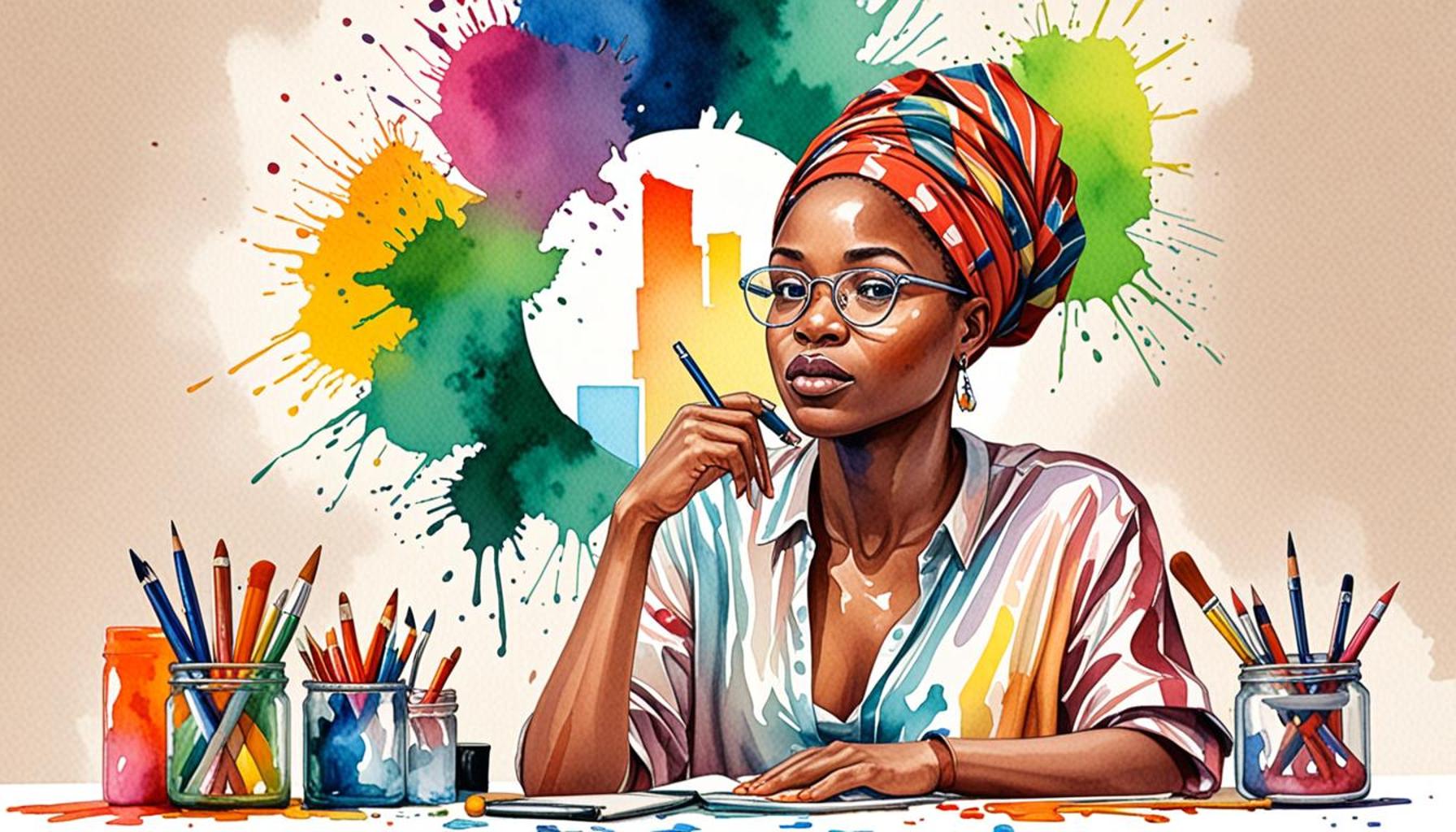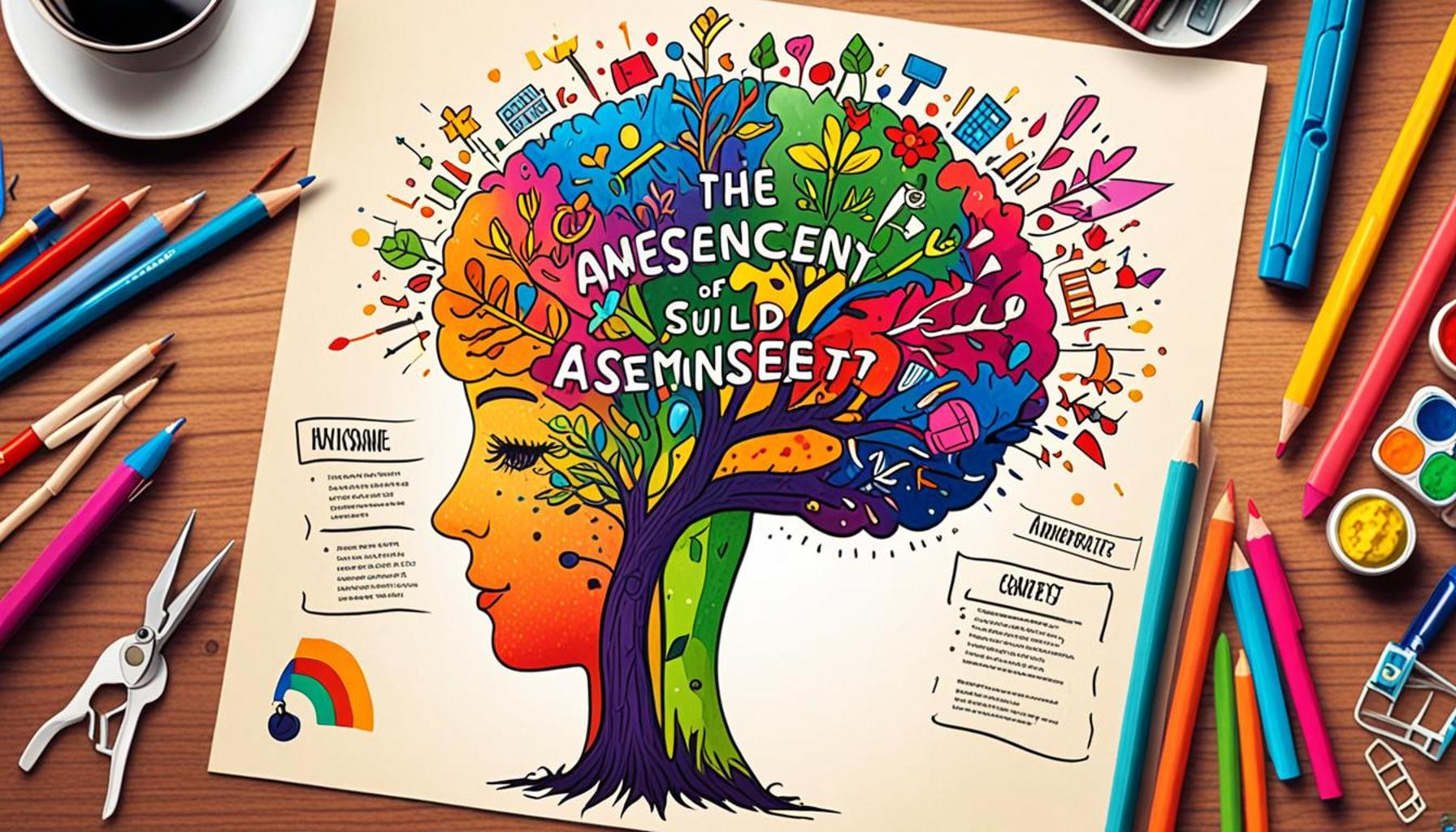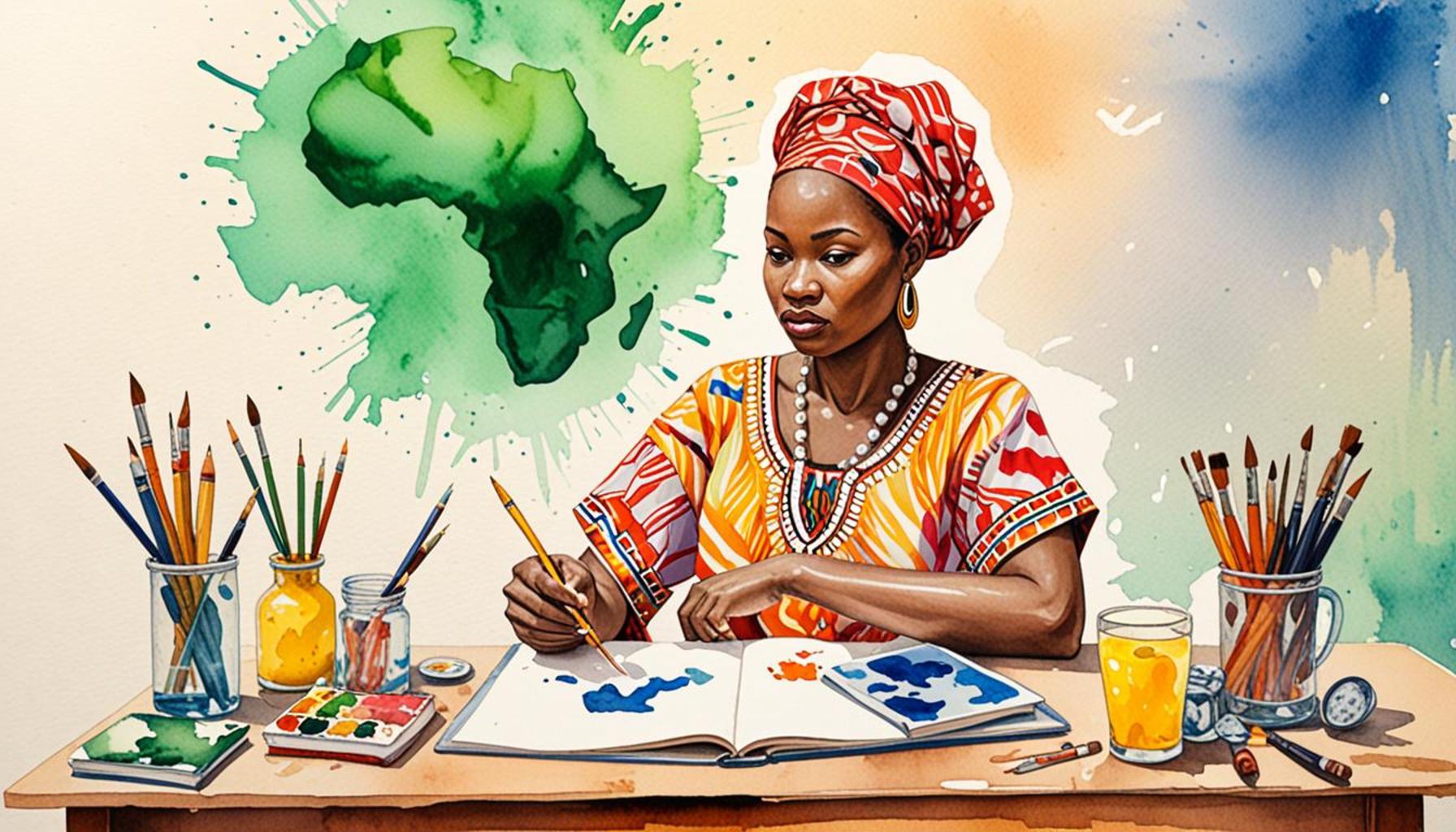Techniques for Self-Reflection to Foster Creativity in Nigerian Professionals

The Importance of Self-Reflection in Boosting Creativity
In a world that is constantly adapting and changing due to technological advancements and market fluctuations, the need for innovation and creativity among professionals in Nigeria has never been more pressing. As various sectors strive to keep pace with global trends, self-reflection emerges as an essential strategy that can enhance creative potential and lead to professional success. By engaging in introspective practices, individuals can uncover unique insights that pave the way for new perspectives and innovative solutions.
Effective Techniques for Self-Reflection
There are several techniques for self-reflection that can be particularly effective. These methods not only foster creativity but also enhance personal and professional growth:
- Journaling: Keeping a journal is a powerful way to document thoughts, feelings, and experiences. This practice encourages individuals to articulate their ideas, and when revisited, these writings can reveal patterns and concepts that may have otherwise gone unnoticed. For instance, a Nigerian entrepreneur reflecting on past projects can identify successful strategies and avoid previous pitfalls, ultimately leading to more innovative business practices.
- Meditation: Set aside time to meditate can greatly help in clearing the mind of distractions. This mental clarity enables deeper exploration of creativity. In Nigeria, practices such as mindfulness meditation have gained traction, allowing professionals to cultivate a calm focus that can inspire innovative thinking. The serene atmosphere often found in nature spots like Lekki Conservation Centre can provide the perfect backdrop for this form of introspection.
- Feedback Loop: Collaborating with peers and seeking feedback can be enlightening. Engaging in constructive dialogue with colleagues challenges existing ideas and opens the door to fresh perspectives. For example, in creative sectors like the Nigerian film industry (Nollywood), feedback sessions can spark new storytelling techniques and enrich overall narrative innovation.
Each of these self-reflection methods offers distinctive advantages that support professional encounters. For example, journaling not only clarifies goals but enhances emotional intelligence, essential in navigating interpersonal relationships within the workplace. On the other hand, meditation fosters the mental clarity needed for effective problem-solving, enabling professionals to tackle challenges with a renewed sense of purpose.
Enhancing Collaboration and Innovation
As Nigerian professionals face a variety of unique challenges—from economic uncertainty to shifting industry demands—harnessing the power of self-reflection becomes indispensable. This practice not only promotes personal growth but also nurtures an environment of collaboration and innovation within teams. By delving deep into their thoughts and connecting with their core ideas, professionals can foster stronger team dynamics and cultivate a culture of creativity that is essential for growth in a competitive landscape.
In the forthcoming sections, this article will delve deeper into specific self-reflection techniques tailored to the Nigerian context. By shedding light on these practices, readers will be equipped to unlock their full creative potential, ultimately positioning them for success in their respective fields. Stay tuned for transformative insights that promise to reshape the way creativity is approached within Nigeria’s vibrant professional landscape.
ADDITIONAL INSIGHTS: Expand your understanding here
Practices to Ignite Creative Potential
To fully harness the power of self-reflection in enhancing creativity, Nigerian professionals can employ a variety of techniques. These practices not only facilitate a better understanding of one’s thoughts and emotions but also stimulate innovative thinking that is crucial in today’s competitive market. Here are a few notable methods:
- Vision Boards: Creating a vision board can serve as a powerful visual tool for self-reflection. By collating images, words, and phrases that resonate with personal and professional aspirations, individuals in Nigeria can easily visualize their goals. This practice not only clarifies ambitions but also fosters motivation and serves as a constant reminder of what one aims to achieve in their career.
- Mind Mapping: This structured brainstorming technique allows professionals to explore ideas in a non-linear fashion. By creating diagrams that connect thoughts, Nigerian professionals can easily identify relationships and develop innovative concepts. For instance, a tech startup founder might use mind mapping to generate new app features, leading to breakthroughs that can differentiate their product in the market.
- Personal SWOT Analysis: Conducting a personal SWOT (Strengths, Weaknesses, Opportunities, and Threats) analysis can be an enlightening self-reflection tool. This method encourages professionals to assess their current position within their sector while identifying areas for growth. For example, a young lawyer might discover that embracing technology could provide a competitive advantage in legal practice.
Engaging in these practices offers Nigerian professionals unique opportunities for introspection. Vision boards help individuals remain focused on their long-term aspirations, anchoring their creative efforts in tangible objectives. Similarly, mind mapping nurtures lateral thinking, allowing ideas to evolve through free association, while a personal SWOT analysis provides clarity on one’s capabilities and market position, guiding strategic decisions.
Creating Safe Spaces for Reflection
One of the common challenges faced by Nigerian professionals is the lack of a supportive environment for self-reflection. In fast-paced industries, the pressure to deliver results often overshadows the need for creative thinking. However, establishing safe spaces—either physically or through mentorship programs—can significantly aid in the reflection process. For example, companies can encourage flexible workspaces that allow professionals to engage in group discussions or even host retreats focused on self-discovery and creativity development.
By prioritizing self-reflection and creating conducive environments, Nigerian professionals can tap into a wellspring of creativity that not only enhances personal growth but also propels their organizations forward. As the professional landscape continues to evolve, harnessing these techniques will become crucial for those looking to excel and innovate in their respective fields. The subsequent sections will further explore how these self-reflection practices can be effectively woven into daily routines, creating a culture of creativity within the Nigerian workforce.
| Aspect | Description |
|---|---|
| Introspection | This practice involves deep self-analysis, enabling individuals to understand their thoughts and emotions, which is crucial for creativity. |
| Mind Mapping | A visual tool that helps in organizing ideas and exploring connections, fostering a creative thought process among Nigerian professionals. |
| Feedback Reception | Encouraging openness to constructive criticism allows professionals to refine their ideas, enhancing overall creativity. |
| Journaling | Daily writing encourages self-exploration and can lead to innovative concepts for professionals focused on personal growth. |
Self-reflection techniques not only boost creativity but can also lead to enhanced problem-solving skills and emotional intelligence, which are invaluable in any professional setting. By harnessing these practices, Nigerian professionals can break free from conventional thinking patterns and embrace unique solutions that resonate in their work and community.
RECOMMENDED: Check out this similar article
Integrating Self-Reflection into Daily Routines
To effectively foster creativity among Nigerian professionals, it is essential to weave self-reflection techniques seamlessly into daily routines. Establishing these habits can create a ripple effect, enhancing both individual creativity and organizational innovation. Here are several methods to integrate self-reflection into the everyday professional landscape:
- Journaling: Keeping a daily or weekly journal allows professionals to document thoughts, experiences, and inspirations. In the Nigerian context, where rich cultural narratives thrive, journaling can also serve as a platform to articulate unique viewpoints and creative ideas. By reviewing past entries, individuals can identify patterns in their thinking, pinpoint what fuels their creativity, or even note what hinders it.
- Reflective Reading: Engaging with literature that explores creativity and innovation can spark new ideas. Nigerian professionals could focus on works by notable local authors or international texts that discuss creative problem-solving. Setting aside time for in-depth reflection on these readings can lead to valuable insights that can be applied to their work.
- Daily Reflection Time: Allocating just 10 to 15 minutes at the end of each workday for reflection can significantly impact a professional’s creative outlook. During this time, they can evaluate what went well, what could be improved, and how innovative approaches could have altered outcomes. Making this a daily habit can elevate a Nigerian professional’s capacity for creative thought.
By incorporating journaling, professionals can tap into their inner thoughts, allowing hidden ideas to surface, while reflective reading broadens their understanding of creativity through diverse perspectives. Setting aside daily reflection time establishes a routine that encourages active contemplation, critical for honing one’s creative skills.
Peer Collaboration and Feedback Loops
An equally important aspect of self-reflection is engaging with peers for collaborative feedback. Nigerian professionals can benefit from structured feedback sessions, encouraging a culture of collective reflection. This not only promotes individual growth but also enhances team creativity. For instance, a group within a technology firm could come together monthly to discuss projects, challenges, and creative processes, facilitating a shared understanding of how diverse perspectives can inform innovation.
Moreover, organizations can implement mentorship programs that pair experienced professionals with emerging talents. Mentors can guide mentees through their creative journeys, encouraging them to reflect on their experiences, share insights, and explore new ideas. This collaboration fosters a supportive atmosphere, allowing professionals to feel safe in expressing vulnerability and exploring creativity without judgment.
As professionals actively seek collaboration and feedback, they create cycles of reflection that not only enhance their creativity but also contribute to developing a dynamic and innovative workplace culture. The intersection of individual introspection and collective sharing can yield groundbreaking ideas that resonate within the Nigerian market, ultimately positioning professionals as leaders and visionaries in their fields.
CHECK OUT: Click here to explore more
Conclusion: Embracing Self-Reflection for Enhanced Creativity
In the fast-paced and dynamic landscape of Nigerian industries, self-reflection emerges as a powerful tool to unlock creativity among professionals. While many professionals frequently push through their tasks, dedicating time to reflect on experiences can unlock creativity in unique ways. Techniques such as journaling, which entails writing down thoughts and ideas, can help individuals track their progress and unearth underlying patterns in their creative thinking. For example, a graphic designer may use journaling to document their daily inspirations, leading them to discover a new style that resonates with their personal vision and the local culture.
Reflective reading is another transformative practice. By engaging with a diverse range of literature—ranging from local Nigerian authors to global thought leaders—professionals can glean fresh perspectives and learn from varied experiences. This exposure can spark new ideas that can be applied directly to their work, fostering innovative solutions to industry-specific challenges. Additionally, establishing daily reflection time allows individuals to pause amidst their busy schedules, providing a dedicated space to process thoughts and ideas that may contribute to breakthrough projects.
Moreover, the importance of peer collaboration and feedback cannot be overstated. Encouraging open discussions and mentorship within organizations creates an environment where creativity flourishes through shared experiences and diverse perspectives. For instance, in Nigeria’s burgeoning tech scene, teams that incorporate regular brainstorming sessions often find success in innovating solutions tailored to local needs, such as mobile payment systems that cater specifically to unbanked populations.
As Nigerian professionals engage in structured feedback loops, they enhance not only their creativity but also their capacity to innovate collectively. Leveraging the collective knowledge of diverse talents allows for a more comprehensive approach to problem-solving, fostering partnerships that leverage individual strengths while addressing local challenges with unique solutions.
As we look toward the future, embracing these self-reflection techniques can enhance the innovation capabilities of the Nigerian workforce. This is particularly vital as industries evolve and adapt to global trends. By prioritizing self-reflection, Nigerian professionals can catalyze transformative changes—both within their careers and throughout the industries they serve. Ultimately, cultivating a culture of reflection and collaboration can position Nigeria as a hub of creativity and ingenuity on the international stage.


